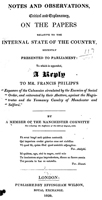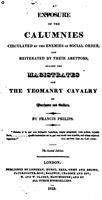
The Peterloo Massacre - Manchester 16th August 1819
TRANSCRIPTION OF : 'NOTES & OBSERVATIONS, Critical & Explanatory, on the Papers Relative to Page 196-200 A REPLY, I was surprised almost beyond expression to find it asserted by Mr. Philips (page 59,) that this town" is now in a state of comparative tranquillity," and the credit of this tranquillity given to the measures of the 16th August. Where, I ask, are these proofs of tranquillity to be found? Is it in the daily increasing number of barracks by which every district of the town is infested? Is it in the daily increasing number of troops quartered among us? Is it in the nightly perambulation of an armed watch and ward? Is it in the nightly piquets of foot and patroles of horse, almost as numerous as the streets they traverse. Is it in the fosses and bastions that now for the first time are seen amongst us? Is it in the subjecting of an extensive district to complete surveillance? Is it in the nocturnal deliberations of an uncontrolled committee? Or, lastly, is it in the announcement of anticipated rebellion? Though the peace of this district has not been, and I am confident will not be, broken by the radicals, I cannot well conceive a more unfortunate assertion than that we are in a state of "comparative tranquillity," except it be that that tranquillity is owing to the measures of the 16th of August. He must be a bold man who would venture to assert that, at any period before the 16th ot`August, was there such a general excitation, such a real or pretended alarm, and such precautions against supposed danger, as we have seen for the last few weeks. For my part, I am no alarmist. I perfectly coincide in the opinion of the venerable Earl Fitzwilliam, that we need not and ought not to distrust the people; but yet I admit that I cannot contemplate without some uneasiness the conduct which the measures of the 16th of August were so obviously calculated to produce; I may say, in some respects, have produced. Until after that, period we had no authentic statements that the people were procuring arms; and, although I am of opinion that the accounts we have recently had of their arming, have been very much exaggerated, there is probably no reason to doubt that they have to a considerable extent provided themselves with arms as the means of defence. Hitherto, every man has undoubtedly had the right to carry arms, and that which is perfectly legal for every separate individual, cannot be contrary to law in an assembly. It is only when the purpose (not surmised or constructive, but proved) for which arms are carried, is against the law, that the carrying of them is constitutionally an offence ; and, though every friend of rational liberty, and of humanity, must lament that any circumstance should have occurred whereby the practice of arming has been rendered of more frequent occurrence, it is only right that the blame should fall where it is justly due, upon those who violently and illegally assaulted a peaceable meeting, which supposed itself under the protection of the law; and not upon those who, injured and denied redress, have found it necessary to furnish themselves with the means of protection and self-defence. That the poor have at former times been guilty, when suffering under severe privations, of conduct which no rational or honest man can attempt to justify, is certainly undeniable. But it is equally true, that notwithstanding the distress amongst the working classes has been quite as severe at periods since 1812, as it was at that time, no later demonstrations of hostility to the use of improved machinery have taken place amongst us. The rapid spread of political knowledge, and of the elements of political economy amongst the labouring classes, has taught them better than to impute their sufferings to the corn dealers when bread is dear, or to their employer when wages are low. I therefore cannot but think, in direct opposition to the opinion expressed by Mr. Philips in the commencement of his dedication, that the actual disturbances of 1812 were far more dangerous than the imputed tendency to disturbance in 1817 and 1819. When the mind of the workman is inflamed, and his passions are excited against his employer, the bad spirit of revenge may be easily satiated. Neither the property nor the life of the latter may be secure, if the former be wicked enough to attack them. The frequent contact, the constant proximity, in which the two parties exist, necessarily afford opportunities of mischief to those who are on the watch to discover them; and though death may be the punishment of the offender's crime, the penalty is no recompence for the injury he has inflicted. Unfortunately, in the year 1812, cases of this sort did exist. They were, however, very much exaggerated, and their circumstances much misrepresented; but though extreme distress might afford some palliation for the conduct of the manufacturing population, it is beyond denial, that a very dangerous spirit was prevalent in several of the manufacturing districts. I have already shewn, in one particular case, how the people were inflamed and incited by the agency of spies, and I have little doubt, that in other instances those miscreants were very active; although, from the want of that investigation, which would have detected their proceedings, the circumstances have not been brought before the public. I am, however, of opinion, that even in 1812, great benefit would have resulted from the display of a conciliatory disposition. If an appeal had been made to the good sense of the people, if the advantage of machinery in sustaining our commercial pre·eminence, if the causes of the high price of food, and the utter inability of farmers or provision dealers to reduce its value, had been clearly and forcibly explained to them, in a style suited to their comprehension, and with a sympathy suited to their sufferings, I cannot but think that the period of disturbance might at least have been shortened, and some individuals have been saved from the last and greatest penalty of the law. In the year 1817, the change which had been operated in the minds of the people was strikingly manifested by their conduct. Notwithstanding all that was said about the disturbances in this district, I have repeatedly and in vain challenged any person to prove, that the slightest disturbances existed. Not a hair of any man's head was touched, not an atom of any man's property injured by the people. The spies were amongst the poor, spreading devilish snares to entrap them; they circulated the falsest statements, to encourage and stimulate to the adoptionof their infernal schemes. Every means were tried, every attempt made, to induce individuals to commit themselves; from the casual and whispered invitation to join in crime, to the threats of punishment and death, in case of refusal. But the people were proof against all, and notwithstanding many arrests were made, some under the Habeas Corpus Suspension Act, and some on definite charges, not one individual prisoner, from this neighbourhood, was brought to trial for any political offence. I should have thought, that the knowledge of this fact, and known it is, would have materially lessened the credit to be attached to political accusations, coming from this neighbourhood. I should have thought, that no individual could be found base enough to hint at the existence of guilt, in a case where the accusers, prejudiced and embittered as they were known to be, durst not bring their prisoners even to trial. I should have thought, none could be found so wickedly diligent, as to rake together the fragments of exploded slander, to dig up its festering relics from the grave of their detected falsehood, in order to vilify the character and destroy the liberties of an industrious, a moral, and an intelligent population. But the fact is otherwise, The Report of the Committee of the House of Lords, in 1817 - that report which the very conduct of those, from whose materials it was constructed, proved to be utterly unworthy of credit, has been again brought before us, to give an extrinsic and adventitious support to that "pyramid of calumny," by which the people are now sought to be overwhelmed. And where has this been done? By whom have these foul fabricatious again been stirred into mischievous activity? In the House of Commons, and by Mr. Wilberforce and Mr. Peel. The scene and the actors are perfectly appropriate. The House of Commons adopts, with voracious eagerness, every extravagant and silly libel against the people, and refuses the inquiry that would prove these aspersions false. It turns a deaf ear to their complaints; and again refuses the inquiry that would shew them to be well founded. In both cases the people suffer. Before I conclude, I shall just notice the great injustice which has been done to the religious character of our population. To hear certain worshipful, and honourable, and noble persons, talk upon this subject, one would suppose all the churches and chapels to be deserted, and all the people to have become infidels. But such notions as these only prove, how ignorant of the state of the country are those who undertake to legislate for it. Within the last three or four years, in Manchester and Salford, and the vicinity so immediate as to form a part of those towns, additional accommodations at various places of worship, have been provided, or are now fitting up, for not less than 12,000 persons. This, I conceive, with those who think Church and Chapel going indicative of religion, will be a sufficient refutation of the charges of an irreligious disposition, that have been so lavishly heaped upon the people. ***************************************************************
'NOTES & OBSERVATIONS, Critical & Explanatory, on the Papers Relative to the Internal State of the Country, Recently Presented to Parliament; to which is appended, a REPLY to Mr. Francis Philips's 'Exposure of the Calumnies circulated by the Enemies of Social Order ...' Transcribed by Sheila Goodyear 2019 LINK to full .pdf document of 'Notes & Observations ...'
on the Internet Archive website to read or download. |
||||||||||||||||||||||||||||||||||||||||||||||||||||||

